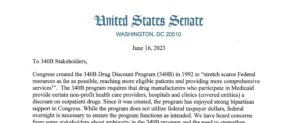Ideas for 340B Changes Could Lead to Legislation
by David Glendinning | December 6, 2023 12:28 pm
 [1]
[1]Amid complaints about unilateral drug company restrictions on the 340B drug pricing program and mounting pressure from industry-backed advocates for even more 340B changes to favor drugmakers, a bipartisan group of six U.S. senators have taken a proactive step by asking for ideas to ensure “stability” for 340B.
This move came in the form of a request for information (RFI) that prompted a raft of responses. Some of the feedback could form the basis for legislation to amend 340B and possibly set the stage for a comprehensive discussion on its future. Those ideas include several proposals by 340B hospitals and other covered entities to strengthen 340B. Also in the mix, however, are proposals by the pharmaceutical industry and its allies that would reduce 340B benefits for providers.
The RFI[2] is from six longtime supporters of 340B, Sens. John Thune (R-S.D.), Debbie Stabenow (D-Mich.), Shelley Moore Capito (R-W.Va.), Tammy Baldwin (D-Wis.), Jerry Moran (R-Kan.), and Ben Cardin (D-Md.). Several of the senators have been critical of the actions of a group of drug companies that have been limiting hospitals’ ability to partner with community and specialty pharmacies to deliver discounted drugs to their patients. The senators’ stated goal is to focus on both “stability and oversight” of 340B.
Hospitals and Pharmacists United
In response, 340B Health[3] offered a series of proposals to strengthen 340B and protect it against the harmful actions of drug companies. These include:
- Restoring the 340B benefit for drugs dispensed through community and specialty pharmacies and prohibiting drug companies from imposing conditions that restrict 340B.
- Allowing covered entities the ability to directly challenge unlawful drug company 340B restrictions or conditions in federal courts.
- Prohibiting discriminatory policies by payers and pharmacy benefit managers (PBMs) for drugs that 340B hospitals administer or dispense to their patients.
- Prohibiting states from mandating that providers use or do not use 340B drugs for Medicaid patients.
- Eliminating statutory provisions that increase drug costs for hospitals, such as the orphan drug loophole and group purchasing organization (GPO) prohibition.
340B Health urged the lawmakers to reject proposals to impose unnecessary and burdensome reporting requirements on 340B hospitals. It asked the senators to encourage the Health Resources & Services Administration (HRSA), which administers 340B, to exercise its existing authority to conduct greater 340B oversight over drug companies and wholesalers, including through more frequent audits and by fully operationalizing the 340B administrative dispute resolution (ADR) process. Finally, 340B Health urged Congress to include protections against HRSA taking any administrative actions to narrow the scope of 340B.
Similar comments went to the six senators from such 340B advocates as the American Hospital Association (AHA), the American Society of Health-System Pharmacists (ASHP), America’s Essential Hospitals (AEH), the Association of American Medical Colleges (AAMC), the Catholic Health Association of the United States, and the Children’s Hospital Association.
Drug Industry Attacks
Given its multi-year, multi-million-dollar campaign to weaken 340B, it was not surprising that the drug industry and its allies weighed in with proposals to shrink the scope of 340B and exclude many hospitals and their patients from its benefits.
The Pharmaceutical Research & Manufacturers of America (PhRMA) said in its comments[4] that it believes 340B should serve a much narrower purpose than Congress intended. The group says Congress should limit 340B to helping “low-income, uninsured, and other vulnerable patients obtain the outpatient medicines they need,” the letter states.
This proposal is contrary to the expressed intentions of Congress when it debated and approved the 340B statute in 1992. In a committee report during that process, Congress said the purpose of 340B was to “stretch scarce federal resources as far as possible, reaching more eligible patients and providing more comprehensive services.”
As a federal judge explained in a recent 340B court decision[5]: “340B entities are able to stretch these scarce Federal resources because they receive their drugs at a discount and are reimbursed by insurers at the non-discounted price of the drug… . This allows 340B entities to provide more services to a larger population of under-served patients.”
To reduce the scope of 340B to fit its narrow vision, PhRMA would have Congress make the 340B definitions of a qualified hospital and a covered patient significantly more restrictive than they are today. Such changes would dramatically reduce the benefit of 340B to providers, directly impacting patient care. The law requires 340B providers to serve all patients, including those with low incomes and those living in underserved rural parts of the country. PhRMA-backed requirements for hospitals and other covered entities to pass the 340B discounts directly to patients would eliminate their ability to invest the savings into providing more comprehensive services.
Other drug industry proposals include limits on hospital-pharmacy partnerships and hospital child sites as well as requirements for hospitals to report information to the government on matters unrelated to 340B, such as their provision of charity care. Drug industry partners submitted similar proposals, including groups that PhRMA funds.
What Comes Next?
The senators who requested these ideas have not set a timeline for next steps. RFIs can lead to hearings, congressional letters to the administration, or proposed legislation. While it is not certain that these ideas and others being considered on Capitol Hill will find their way into legislation, lawmakers might introduce such measures in the coming months. Such legislation would need bipartisan support to pass Congress and be signed into law by President Biden.
- [Image]: https://340binformed.org/wp-content/uploads/2023/12/RFI.jpg
- RFI: https://www.thune.senate.gov/public/index.cfm/2023/6/thune-stabenow-capito-baldwin-moran-cardin-seek-feedback-on-340b-drug-discount-program
- 340B Health: https://www.340bhealth.org/files/340B_Health_Response_to_Senate_RFI_(7.28.2023)_.pdf
- comments: https://www.340bhealth.org/files/PhRMA_Comments_on_340B_RFI.pdf
- decision: https://www.340bhealth.org/files/Order_-_Genesis.pdf
Source URL: https://340binformed.org/2023/12/ideas-for-340b-changes-could-lead-to-legislation/